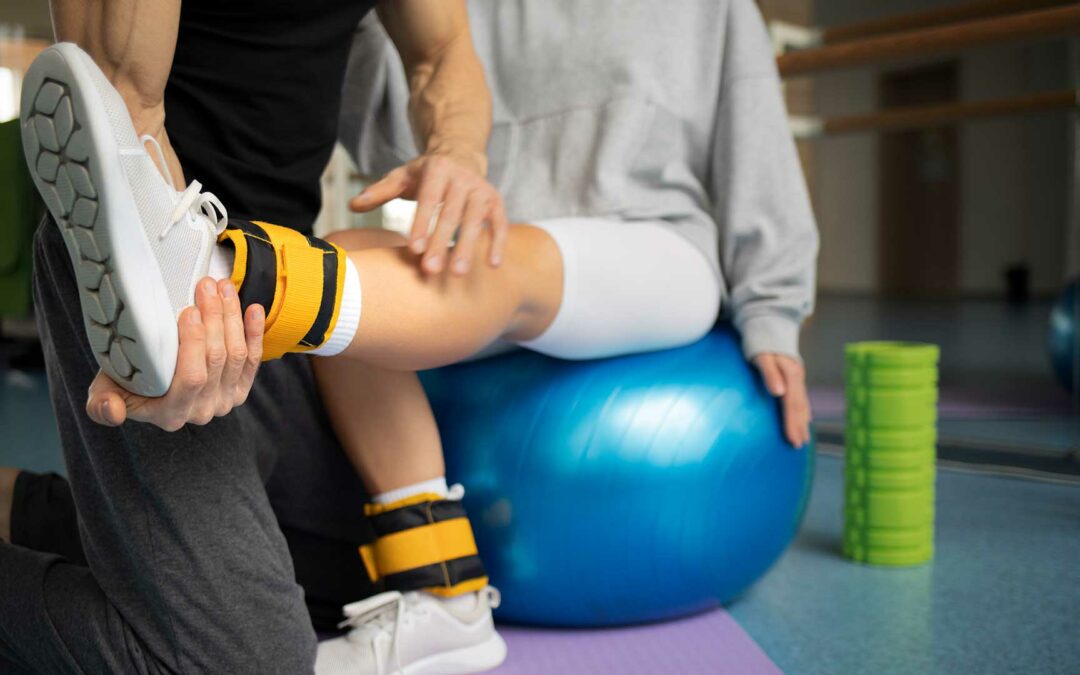What will readers learn from this article?
- Readers will learn how to perform the Step Lunge with Shoulder Press exercise correctly.
- Readers will learn about the benefits of this exercise for treating knee problems.
- Readers will learn how physiotherapists use this exercise in knee rehabilitation.
What is the Step Lunge with Shoulder Press exercise and how is it used by physiotherapists to treat knee problems? As a physiotherapist, I frequently recommend the Step Lunge with Shoulder Press exercise to my patients as a highly effective solution for knee issues. This compound movement targets the muscles surrounding the knee joint, improves stability, and increases range of motion. In this article, I will provide a detailed explanation of the Step Lunge with Shoulder Press exercise and how physiotherapists utilize it in knee rehabilitation.
What is the Step Lunge with Shoulder Press Exercise?
The Step Lunge with Shoulder Press exercise is a compound movement that combines a lunge with an overhead shoulder press. It engages multiple muscle groups simultaneously, including the quadriceps, hamstrings, glutes, core, and shoulder muscles. Not only does this exercise target the muscles around the knee joint, but it also improves overall lower body strength and upper body stability.
To perform the Step Lunge with Shoulder Press, start by holding a dumbbell in each hand at shoulder level, with your elbows bent and palms facing forward. Take a step forward with your right foot into a lunge position, ensuring that your knee is directly above your ankle and your back knee is hovering just above the ground. As you lower into the lunge, simultaneously press the dumbbells overhead until your arms are fully extended. Return to the starting position by stepping back with your right foot and lowering the dumbbells back to shoulder level. Repeat the movement on the opposite side.
Benefits of the Step Lunge with Shoulder Press Exercise for Knee Problems
The Step Lunge with Shoulder Press exercise offers several benefits for individuals with knee problems. Firstly, it targets and strengthens the muscles surrounding the knee joint, including the quadriceps and hamstrings, which play a crucial role in knee stability and support. By strengthening these muscles, the exercise helps alleviate knee pain and reduce the risk of further injury.
Additionally, the Step Lunge with Shoulder Press exercise improves muscle support and stability around the knee joint. Weak muscles can contribute to knee problems, and by engaging multiple muscle groups simultaneously, this exercise helps improve overall lower body stability, reducing the strain on the knee joint.
Furthermore, this exercise promotes increased range of motion and flexibility in the knee joint. The combination of the lunge and shoulder press movements requires a wide range of motion in both the lower body and upper body, resulting in improved flexibility and mobility in the knee joint.
| Benefits of the Step Lunge with Shoulder Press Exercise for Knee Problems | How Physiotherapists Use the Step Lunge with Shoulder Press Exercise for Knee Rehabilitation |
|---|---|
| Targets and strengthens the muscles surrounding the knee joint | Conduct thorough assessment to determine exercise suitability |
| Alleviates knee pain and reduces risk of further injury | Customize intensity and modifications based on patient’s capabilities and goals |
| Improves muscle support and stability around the knee joint | Monitor patient’s form and progress, making adjustments as necessary |
| Promotes increased range of motion and flexibility in the knee joint | Educate patients on proper technique and form during the exercise |
How Physiotherapists Use the Step Lunge with Shoulder Press Exercise for Knee Rehabilitation
Physiotherapists play a crucial role in utilizing the Step Lunge with Shoulder Press exercise for knee rehabilitation. They conduct a thorough assessment to determine the exercise’s suitability for each individual based on their specific condition and needs, including muscle strength, joint stability, and range of motion.
Once deemed appropriate, physiotherapists customize the intensity and modifications of the Step Lunge with Shoulder Press exercise based on the patient’s capabilities and goals. They carefully monitor the patient’s form and progress, making adjustments as necessary to ensure optimal rehabilitation and pain management.
Physiotherapists also educate patients on the importance of proper technique and form during the exercise. They emphasize the alignment of the knees with the toes, proper core engagement, and controlled movements throughout the exercise to maximize its effectiveness and prevent any unnecessary strain on the knee joint.
Step-by-Step Guide: Performing the Step Lunge with Shoulder Press Exercise Correctly
To perform the Step Lunge with Shoulder Press exercise correctly, follow this step-by-step guide:
- Begin by standing with your feet hip-width apart, holding a dumbbell in each hand at shoulder level, with your elbows bent and palms facing forward.
- Take a step forward with your right foot, ensuring that your knee is directly above your ankle and your back knee is hovering just above the ground.
- As you lower into the lunge position, simultaneously press the dumbbells overhead until your arms are fully extended.
- Return to the starting position by stepping back with your right foot and lowering the dumbbells back to shoulder level.
- Repeat the movement on the opposite side, stepping forward with your left foot into a lunge position and pressing the dumbbells overhead.
- Continue alternating sides for the desired number of repetitions.
Note: It is important to maintain proper form throughout the exercise. Avoid allowing the front knee to extend beyond the toes and keep your core engaged for stability and control.
Precautions and Considerations
Before starting the Step Lunge with Shoulder Press exercise, it is essential to warm up your body with some light cardiovascular activity, such as brisk walking or cycling. This helps increase blood flow to the muscles and prepares them for the exercise.
It is crucial to start with a weight that is appropriate for your fitness level and gradually increase the intensity as you become stronger. Overexertion or using excessive weight can lead to injury and hinder your progress.
If you have any pre-existing knee conditions or concerns, it is recommended to consult with a healthcare professional or physiotherapist before attempting the Step Lunge with Shoulder Press exercise. They can provide personalized guidance and support, ensuring that the exercise is suitable for your specific needs and goals.
Case Study: Sarah’s Journey to Knee Rehabilitation with the Step Lunge with Shoulder Press Exercise
Sarah, a 35-year-old avid runner, had been struggling with knee pain for several months. She was diagnosed with patellofemoral pain syndrome, a common knee problem caused by overuse and misalignment of the patella. Frustrated with her limited mobility and the constant discomfort, Sarah sought the help of a physiotherapist to find a solution.
During her initial assessment, the physiotherapist recommended incorporating the Step Lunge with Shoulder Press exercise into Sarah’s rehabilitation program. The exercise targeted the muscles around the knee joint, promoting stability and strength. Intrigued, Sarah decided to give it a try.
Under the guidance of her physiotherapist, Sarah learned the proper technique and form for the Step Lunge with Shoulder Press exercise. Holding a pair of dumbbells, she would step forward into a lunge position while simultaneously raising her arms overhead. This dynamic movement engaged her quadriceps, glutes, hamstrings, and shoulders, providing a comprehensive workout for her entire lower body and upper body.
Sarah started with a light set of dumbbells and gradually increased the weight as her strength improved. Her physiotherapist closely monitored her progress, making adjustments to the exercise intensity and modifications to accommodate her specific needs. With each session, Sarah noticed improvements in her range of motion and flexibility in her knee joint.
After several weeks of consistent practice, Sarah experienced a significant reduction in knee pain. The Step Lunge with Shoulder Press exercise had not only strengthened her muscles but also improved her overall knee stability. She was able to resume her running routine with confidence, knowing that her knee was well-supported and protected.
Sarah’s success story showcases the effectiveness of the Step Lunge with Shoulder Press exercise in knee rehabilitation. With the guidance of a physiotherapist, individuals like Sarah can regain their mobility, alleviate pain, and return to their active lifestyles. By incorporating this exercise into their routine, they can take control of their knee health and experience long-lasting results.
Frequently Asked Questions (FAQs)
Q: Can the Step Lunge with Shoulder Press exercise be modified for beginners?
A: Yes, beginners can modify the exercise by performing the lunge without the shoulder press initially. This allows them to focus on mastering the lunge movement and gradually incorporate the shoulder press as their strength and stability improve.
Q: Is the Step Lunge with Shoulder Press exercise suitable for individuals with knee arthritis?
A: The Step Lunge with Shoulder Press exercise can be beneficial for individuals with knee arthritis. However, it is crucial to consult with a healthcare professional or physiotherapist to assess the exercise’s suitability and make any necessary modifications based on your condition.
Q: How many times a week should I perform the Step Lunge with Shoulder Press exercise?
A: The frequency of performing the Step Lunge with Shoulder Press exercise depends on your fitness level, goals, and any underlying knee issues. It is recommended to start with 2-3 sessions per week and gradually increase the frequency as your strength and endurance improve.
Conclusion
The Step Lunge with Shoulder Press exercise is a highly effective physiotherapy solution for treating knee problems. By targeting the muscles surrounding the knee joint, improving stability, and increasing range of motion, this exercise helps alleviate knee pain, enhance muscle support, and improve overall knee function. However, it is crucial to perform the exercise with proper form and under the guidance of a healthcare professional or physiotherapist. Consistency, proper technique, and personalized support are key to achieving optimal results in knee rehabilitation. So, if you’re looking to address knee problems and improve your overall knee health, consider incorporating the Step Lunge with Shoulder Press exercise into your routine with the guidance of a healthcare professional.
Remember, your health and well-being are of utmost importance, and seeking professional guidance ensures the exercise is tailored to your needs and capabilities. Stay committed, listen to your body, and enjoy the benefits of a stronger, healthier knee joint!

